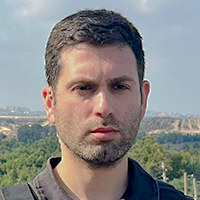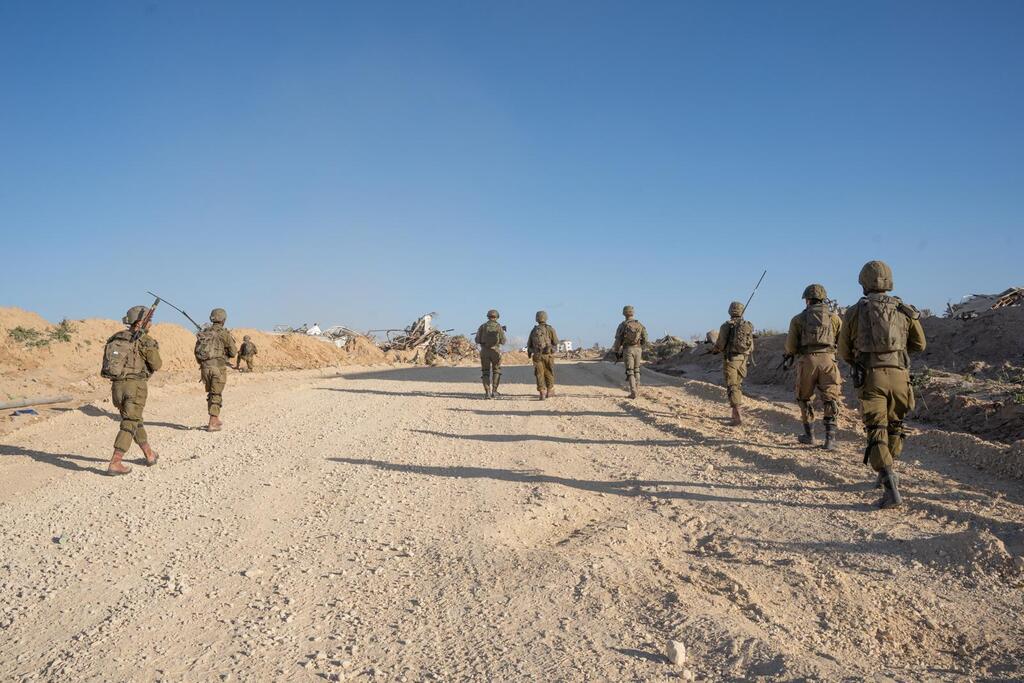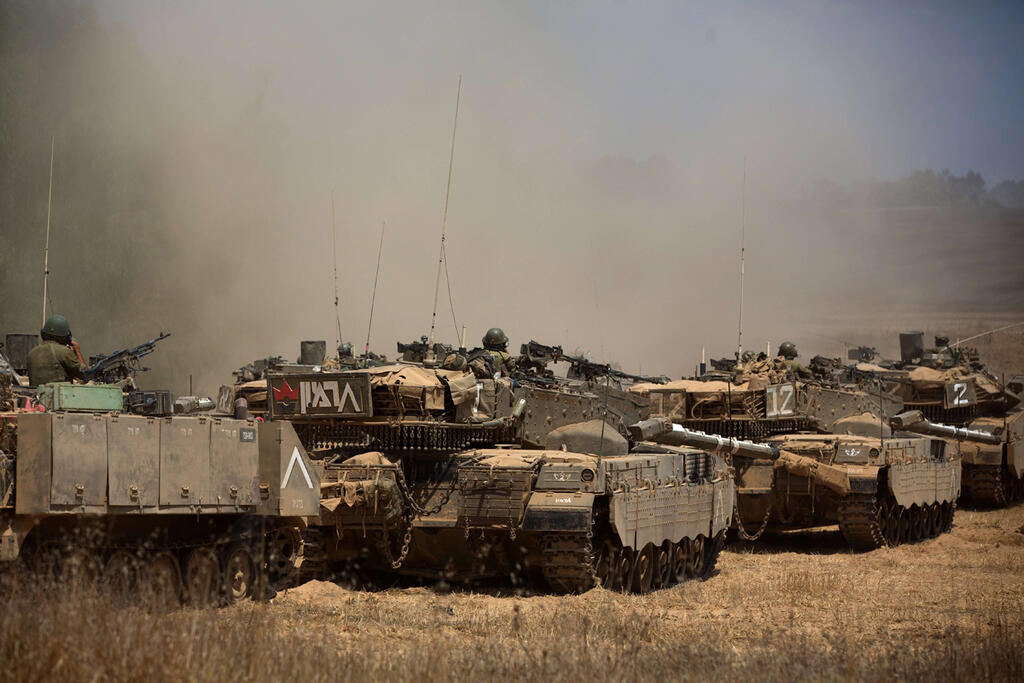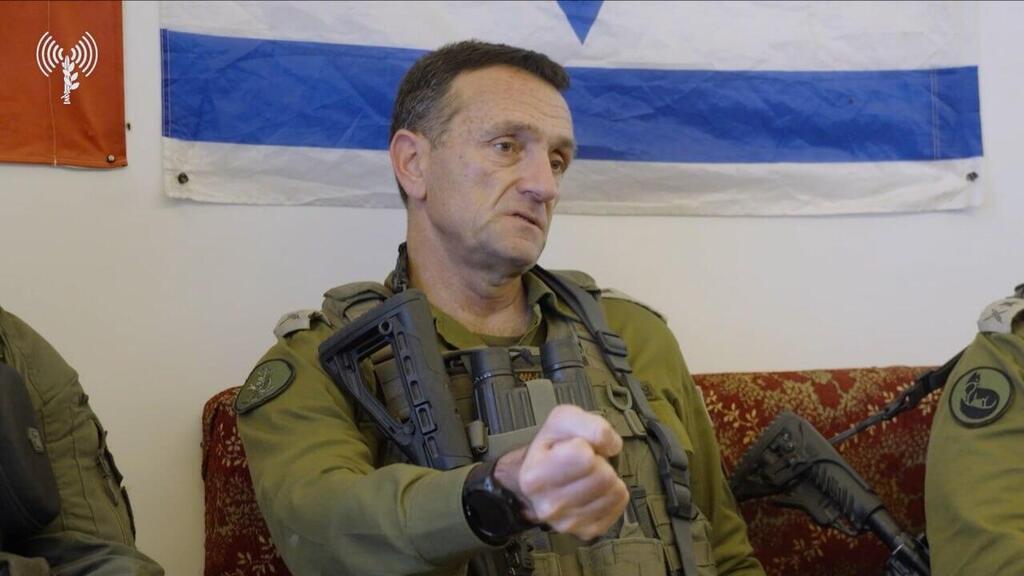Getting your Trinity Audio player ready...
Six months after October 7, the Israeli government still insists on defining the current situation as a war, despite the conclusion of the ground operation in Gaza, with most forces having left Gaza nearly three months ago, and any potential action in Rafah and Deir al-Balah being limited and targeted.
Sunday before dawn, the IDF withdrew most of the remaining forces from the Gaza Strip. Now, only a few hundred soldiers are left in the enclave, compared to the peak of 30,000-40,000 (about 20 brigades) during the height of the ground operation.
The withdrawal included all forces from the 98th Division, which had been active in the southern Khan Younis area in recent months. The Nahal Brigade, holding Road 749 that bisects the territory from the border near Kibbutz Be'eri to the sea, remains primarily as a bargaining chip for future negotiations, from which soldiers launch targeted raids in other areas.
However, Sunday, just before 1 PM – only hours after the withdrawal of the forces – five rockets were launched from the Khan Younis area toward the surrounding Israeli communities, with the Iron Dome system intercepting two of them.
The IDF is now awaiting a decision from the political leadership regarding a possible action in Rafah, Hamas' last major stronghold where four battalions of the terror organization operate, and says it could return to Khan Younis if necessary.
The military explained that holding redundant positions and introducing forces that could be endangered in southern Gaza is not advisable, but actions should be based on intelligence going forward.
The IDF also emphasized that the U.S. pressure applied on Israel is unrelated to the withdrawal from Khan Younis. Another consideration contributing to the move is the desire to leave space for the masses of displaced Gazans who will need to leave Rafah if and when a comprehensive raid is conducted there.
Ynet military correspondent Elisha Ben Kimon reported Sunday that IDF Chief of Staff Lt. Gen. Herzi Halevi said that “the war in Gaza continues” despite the 98th Division's withdrawal from Khan Younis.
“We are far from stopping. The IDF has not left the Gaza Strip. We currently have many fighters in Gaza,” he said.
“This is a long war where we cannot maintain the same force configuration at all times. We are changing forces and modes of operation. We will not allow Hamas brigades to remain active in any part of the Strip. We have plans, and we will act when we decide."
The army chief underscored that one of the war's objectives, the return of the hostages, is "urgent and important, with a different timeline than other goals."
He also appeared to send a message to the political echelon, saying, "The IDF is strong enough for the State of Israel to afford the prices for bringing back its sons and daughters. We have a moral obligation to them, and the IDF can bear a significant cost and will also know how to return and fight with full force."
Defense Minister Yoav Gallant, who held a situation assessment Sunday at Southern Command alongside Defense Ministry Director-General Maj. Gen. (res.) Eyal Zamir, Southern Command Chief Maj. Gen. Yaron Finkelman and General Staff officers made it clear that the IDF would continue to operate in the Gaza Strip.
"The achievements of the 98th Division and its units are most impressive – striking terrorists, destroying enemy targets, warehouses, weapons, underground facilities, command centers, communication rooms - all these were carried out impressively, and thus Hamas ceased to function as a military organization throughout the Gaza Strip," Gallant said.
"The forces are withdrawing and preparing for their next missions; we've seen examples of such missions in action in Al Shifa Hospital. We will reach a situation where Hamas does not control the Gaza Strip and does not function as a military framework posing a risk to the citizens of Israel."
The military clarified and anticipated that dismantling Hamas' army would take many months and prepared the public for 2024 as a year of warfare. However, they also stated that Phase C of the fighting would be less intense, including the release of reserve brigades that have been grinding for about 100 days in Gaza and in the electronic warfare sectors.
Some military officials estimate that a complete defeat of the terror army will take at least an additional 3-4 years, theoretically allowing the political echelon to continue declaring a state of war until 2027.
"It's very similar to what happened in Operation Defensive Shield. We struck terror organizations hard by occupying West Bank cities for a month and a half with regular and reserve brigades, but the fighting continued afterward on a smaller scale, and the Second Intifada terror was only subdued by 2006-2007," said a military source.
"Even then, it didn't disappear, certainly wasn't eradicated, and that's what will happen in the Strip, where a much larger and more powerful terror army was built over the last 15 years compared to what existed in the West Bank in the early 2000s."
Criticism within the IDF about freezing the definition of the situation joins the erosion of IDF achievements in the Gaza Strip against the political echelon's refusal to find a less hostile alternative to Hamas to govern the territory's two million Palestinians after the IDF's exit from there.
"Everywhere we maneuvered, operated, lost soldiers and significantly hit Hamas, and then left, Hamas returned to try and rule again because it has no alternative in Gaza. At this rate, we'll be fighting there for years," added the source.
According to the source, "There is a range of solutions for the future of the Gaza Strip, and all are supposed to be decided and determined by the political echelon: re-establishing Israeli settlements, martial law over two million Palestinians, withdrawing from the territory and restoring Hamas control.
“The problem is that for any such solution, the IDF is supposed to prepare and get ready over months, yet still, nothing moves. In some places, the IDF could have acted faster in the Strip but didn't know that defeating a Hamas battalion would take five weeks instead of two."
Veteran IDF officers also remind that in recent decades, there were years of intense fighting not defined as war, from the Second Intifada years to the Katushya rocket barrages on the Galilee and the IDF's weekly confrontations with Hezbollah in the security zone in southern Lebanon.
Meanwhile, one consequence of the situation still being defined as "war," despite currently being in a much less intense phase, is that senior commanders who want to take responsibility and resign are not doing so as long as the status has not changed.
According to IDF sources, at least four officers at the rank of lieutenant colonel, including commanders of combat units, have informed their associates that they decided to retire from the military due to the blunders and failures of October 7, but are waiting for the war to end.
The entire senior command has announced that it takes responsibility for the failures of October 7, but beyond these statements, the IDF has almost returned to routine in recent months: appointment cycles are conducted "so the army does not freeze in place," including officers who served in relevant positions in the Southern Command or in the Military Intelligence; various courses, including combat ones, have resumed their schedules; the Home Front Command has lifted most of its restrictions on the public and accordingly, rocket fire has greatly decreased, especially toward central Israel. Ben-Gurion Airport also returned to hosting foreign airlines that resumed flights to Israel.
The chain of command that faltered on October 7 "benefits" from the freezing of the situation as "war" and continues to command various missions – from the Gaza Division commander, the 8200 Unit commander to seniors like the chief of Military Intelligence, the Southern Command chief, the Shin Bet director and IDF chief of staff.
Some IDF officials believe that declaring the end of the war would immediately lead to a domino effect, which politicians like Defense Minister Gallant and Prime Minister Benjamin Netanyahu are deterring: a staggered and widespread resignation of military seniors, leaving the political echelon – responsible at its level for the mishaps – alone against an even heavier public pressure to also resign, not just satisfied with military resignations.
Already today, many field commanders are disillusioned by the failures of October 7 and the helplessness in which the residents of the Western Negev were left facing Hamas' murderous invasion. Some military officials estimate that if a decision to end the war is not taken, seniors in the military and other security bodies will resign within six to eight weeks regardless. "Reality is stronger and it will eventually explode. It can't be engineered," a source said.
It has also been revealed that some of the internal probes already underway in the IDF are exposing severe flaws and exchanges of blame within the military, likely to accelerate the resignation of officers.
The IDF has begun these investigations slowly and with delays, expected to conclude around June, with findings to be presented to the public in the summer. There's little discussion of external investigations, perceived as more credible and independent, like inquiry commissions led by retired generals, despite half a year passing since the war began.
IDF Chief of Staff Halevi intended to appoint such inquiry commissions led by senior military officials who retired years ago, as was done after the Second Lebanon War. However, this intention was met with fierce opposition from the political echelon, prompting Halevi to retract and, at least temporarily, shelf this plan.
A state inquiry commission does not seem imminent. The government may delay its appointment amid severely damaged public trust in both the military and political leadership, with about 100,000 Israelis fearful of returning to their homes in the north and south.
The start of the school year in the north in just five months is shrouded in uncertainty, and the military hopes for impromptu solutions for northern students, such as extensively secured educational frameworks near the abandoned settlements, ensuring that communities remain united and do not disband.
The IDF said in response, "The IDF has been engaged in intense warfare on several fronts simultaneously for about half a year, focused on achieving the war's objectives and will continue to act to maintain the security of the citizens of the State of Israel."
Prof. Kobi Michael, a senior researcher at the Institute for National Security Studies, explained, "Declaring a state of war is a statutory matter that allows the activation of a range of laws and emergency regulations from that moment, for example, Section 8 orders which are exceptional (emergency reserve duty call-ups)," he said.
"The Yom Kippur War officially ended after six weeks, with a cease-fire. I do not recall such a lengthy period of a defined state of war. In principle, the situation could be defined this way for years if the government does not decide otherwise. The decision regarding the end is one that the government needs to make, and it can exercise this authority without consulting the professional echelon."







